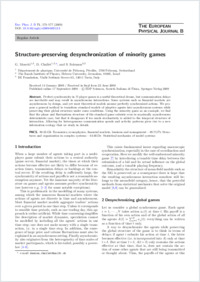Structure-preserving desynchronization of minority games
- Mosetti, Giancarlo Département de physique, Université de Fribourg, Switzerland - ISI Foundation, Turin, Italy
- Challet, Damien Département de physique, Université de Fribourg, Switzerland - ISI Foundation, Turin, Italy
- Solomon, S. The Racah Institute of Physics, Hebrew University, Jerusalem, Israel - ISI Foundation, Turin, Italy
-
16.09.2009
Published in:
- The European Physical Journal B. - 2009, vol. 71, no. 4, p. 573-577
English
Perfect synchronicity in N-player games is a useful theoretical dream, but communication delays are inevitable and may result in asynchronous interactions. Some systems such as financial markets are asynchronous by design, and yet most theoretical models assume perfectly synchronized actions. We propose a general method to transform standard models of adaptive agents into asynchronous systems while preserving their global structure under some conditions. Using the minority game as an example, we find that the phase and fluctuations structure of the standard game subsists even in maximally asynchronous deterministic case, but that it disappears if too much stochasticity is added to the temporal structure of interaction. Allowing for heterogeneous communication speeds and activity patterns gives rise to a new information ecology that we study in details.
- Faculty
- Faculté des sciences et de médecine
- Department
- Département de Physique
- Language
-
- English
- Classification
- Physics
- License
-
License undefined
- Identifiers
-
- RERO DOC 13193
- DOI 10.1140/epjb/e2009-00312-3
- Persistent URL
- https://folia.unifr.ch/unifr/documents/301236
Statistics
Document views: 105
File downloads:
- Document: 139
